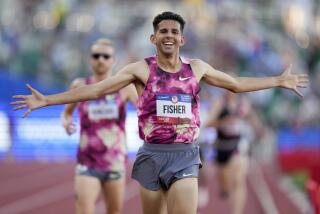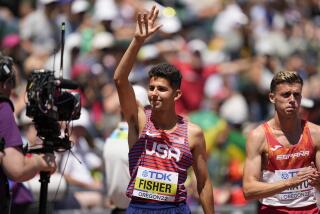WINTER OLYMPICS : Men’s 10,000 Meter Speed Skating : Gustafson Is First Double Winner
- Share via
CALGARY, Alberta — Think about skating as fast as you can for about six miles. Then think about seeing a doctor.
Sunday, this is what an exhausted Hans Van Helden of France felt like doing. He glided across the finish line and didn’t stop until he pulled a header into the padded wall at the side of the track.
Van Helden’s condition was not considered serious, unlike the Olympic 10,000-meter speed skating race.
Sweden’s Tomas Gustafson became the first double-gold medal winner in the Olympics when he won the 10,000 in a world-record time of 13 minutes 48.2 seconds.
In the 10,000, however, time moves ever so slowly. It requires 25 laps and 100 left turns. Australian Colin Coates, skating in the last pair, took the ice 5 hours, 55 minutes after the first pair.
Coates, the Australian coach, is 41 years old and was probably 21 when his race started.
The 10,000-meter race is the longest event in the sport of speed skating. Women do not compete at this distance, presumably because they have more sense.
In addition to being the longest race, the 10,000 meters is often one of the dullest. But Sunday wasn’t one of those days.
Comedy--The laces on one of Yoshiyuki Shimizu’s skates became untied during the race. The Japanese skater stayed in his lane, bent over and retied the laces as he glided around the track.
Tragedy--Geir Karlstad of Norway, who had held the 10,000-meter world record for a little over two months, fell with seven laps to go and didn’t finish the race.
He hit the track like a ton of ice cubes. Karlstad was near tears afterward.
“The ice was perfect,” he said. “It was me. I am empty.”
Drama--Gerard Kemkers of Holland also fell, which really surprised him.
“The first thing I know, I was sitting on the ice,” he said.
Skating in the same pair with Alexandre Mozin of the Soviet Union, Kemkers fell in the fifth lap and watched Mozin take a big lead on him.
“For a second, I thought ‘Should I stop or should I go?’ ” Kemkers said. “Then I went. I decided, yes, I want to beat the Russian.”
Kemkers caught up with Mozin and passed him on the ninth lap. Kemkers finished fifth.
He figures he lost 10 seconds because of the fall, which probably cost him a medal, because teammate Leo Visser took the bronze with a time about eight seconds faster than his.
Victory--Gustafson knows something about being both fast and slow. In the 1984 Olympics at Sarajevo, Yugoslavia, he won the gold medal in the 5,000 meters and returned to his hometown to celebrate.
When he competed the next year in the World Championships as the favorite, Gustafson finished eighth. Gustafson said he wasn’t the favorite in Eskilstuna any longer.
“People looked at me very oddly,” he said.
His father died the next summer, right after Gustafson had a knee operation and then contracted meningitis.
“I was down, down, down,” he said.
Now, Gustafson has taken a different direction. “To start two races and get two gold medals, that’s so satisfactory, it’s unbelievable,” he said.
“I worked hard for this. And now you see a happy man. I got what I wanted.”
When he isn’t skating, Gustafson writes poetry. Here is what he wrote in his down period:
They talk about people being crazy
And some of us they say are also lazy.
I never knew what they meant completely
I only know about the way they treat me.
Some say we have to sweat,
But, oh, they must forget
How nice it is to play in the sun
I want to have some fun.
It’s called ‘Holiday All the Year Around.” It’s also probably poetry on ice, and sometimes one can also say that about a 10,000-meter race.


